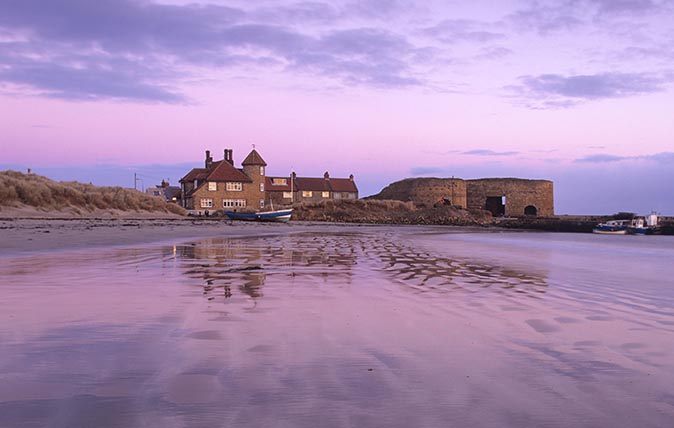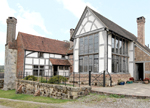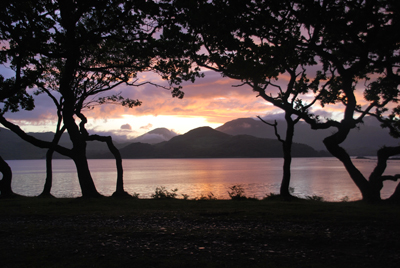The pros and cons of second homes – and how to be a responsible second home owner
Owners of holiday homes can all too easily come into conflict with permanent residents of some of Britain's prettiest spots – but it doesn't have to be that way, as Eleanor Doughty explains.


Exquisite houses, the beauty of Nature, and how to get the most from your life, straight to your inbox.
You are now subscribed
Your newsletter sign-up was successful
They call them ‘down from Londoners’ or, in the case of the Northumbrian fishing village of Beadnell, ‘up from Yorkshiremen’. Some 54% of British buyers, undeterred by the 3% Stamp Duty levy, still want to buy a holiday home in the UK (according to Jackson-Stops), but at the moment, second-home owners are far from flavour of the month.
Earlier this summer, a neighbourhood plan was finalised in Northumberland, part of which will solidify a new restriction on new-build properties being used as second or holiday homes. The chair of Beadnell Parish Council, Jennifer Hall, has spent the past 13 years working towards the finalisation of what is now called the North Northumberland Coast Neighbourhood Plan, encompassing the villages of Bamburgh, Beadnell and Seahouses.
As part of this, all new-build properties in the area will be subject to Section 106 of the Town & Country Planning Act 1990, which places ‘a requirement on the land that the building will be a permanent residence,’ says Miss Hall. However, that doesn’t stop existing properties migrating to holiday-home status.
Beadnell has long been popular with holidaymakers. ‘In the 1960s and 1970s,’ Miss Hall explains, ‘there was no problem. People bought a house, came up most weekends and became part of the community.’ It was when developments began to be built specifically as holiday lets that problems arose. ‘They’re let out twice a week – Friday to Monday and then Monday until Friday morning,’ Miss Hall says. ‘In your street, you might have the last or the second last house that isn’t a holiday home.’
This has a great deal of impact, she adds, with cars clogging up the streets, not to mention the noise factor. ‘If you go on holiday, you might want to have a party and sit drinking in the garden until 2am’, a habit that’s not ideal for the neighbours.
However, it’s more than just anti-social behaviour that local residents object to. Communities tend to hollow out. ‘We’ve recently lost the middle school near Beadnell, so now children leave at 11 and have to go 15 miles away to Alnwick,’ says Miss Hall.
Not that there are many children. ‘We have the highest percentage of older people and lowest percentage of young people of school age (under 17) in the county. You only see children here in the summer and they’re either grandchildren of the residents or holidaymakers.’
Exquisite houses, the beauty of Nature, and how to get the most from your life, straight to your inbox.
It isn’t only in Northumberland that communities feel empowered to make changes. Over the past few years, local groups in the West Country have pulled together to oppose second-home developments. In June, Mevagissey, near St Austell, became the fifth Cornish community to block the sale of new-build properties as second homes, with 90% in favour.
This follows a High Court ruling in November 2016 that St Ives should keep its ban on new-build second homes, as voted for in a referendum in May of the same year.
All of this is power to the people, says buying agent Henry Pryor, who champions community action. ‘It’s a rare example of localism, something that I would encourage everybody to look at.’
Samuel Gibson, a partner at Strutt & Parker’s Morpeth office, agrees: ‘These are the people who live here and they’re steering the direction of their own backyard.’
Campaigners against second-home ownership are usually accused of Nimbyism, but, often, the finances don’t stack up. ‘In my 34 years of buying and selling homes in Rock or Brancaster, or any of these second-home centres, I’ve never heard anybody say “I won’t sell to a newcomer, only a local”,’ says Mr Pryor.
‘People get stressed about it,’ he continues, ‘but few do the decent thing and put their money where their mouth is. People think there should be a free market for them when they’re selling, but not for others. It has ever been thus. ‘
Once upon a time, locals were up in arms when the railways came and now, of course, people want a railway station to serve the community.’ What goes around comes around.
How to be a good second-home owner
- If you’re renting out your property, ask your guests to keep noise down at night
- Look into alternative parking solutions to reduce congestion on local streets, whether it’s you or guests staying
- Consider where you’re buying and why. The best reason to buy a second home is because you want to enjoy it yourself (even if the rental income does seem appealing)

Renting your holiday home
The Government has launched a consultation on the reformation of the tax rules for owners who rent out their holiday

Credit: Galbraith
The untouched 'Island of Goats', a short boat ride from the Argyll coast, is looking for a new owner
Rich with areas of ancient woodland and extensive wildlife, this stunning island off Argyll’s secret coast provides the opportunity to

Heavenly holiday homes on Scottish islands
From a restored 18th-century farmhouse on the Isle of Skye to a castle on Orkney, Mary Miers lists the loveliest
Country Life is unlike any other magazine: the only glossy weekly on the newsstand and the only magazine that has been guest-edited by His Majesty The King not once, but twice. It is a celebration of modern rural life and all its diverse joys and pleasures — that was first published in Queen Victoria's Diamond Jubilee year. Our eclectic mixture of witty and informative content — from the most up-to-date property news and commentary and a coveted glimpse inside some of the UK's best houses and gardens, to gardening, the arts and interior design, written by experts in their field — still cannot be found in print or online, anywhere else.

